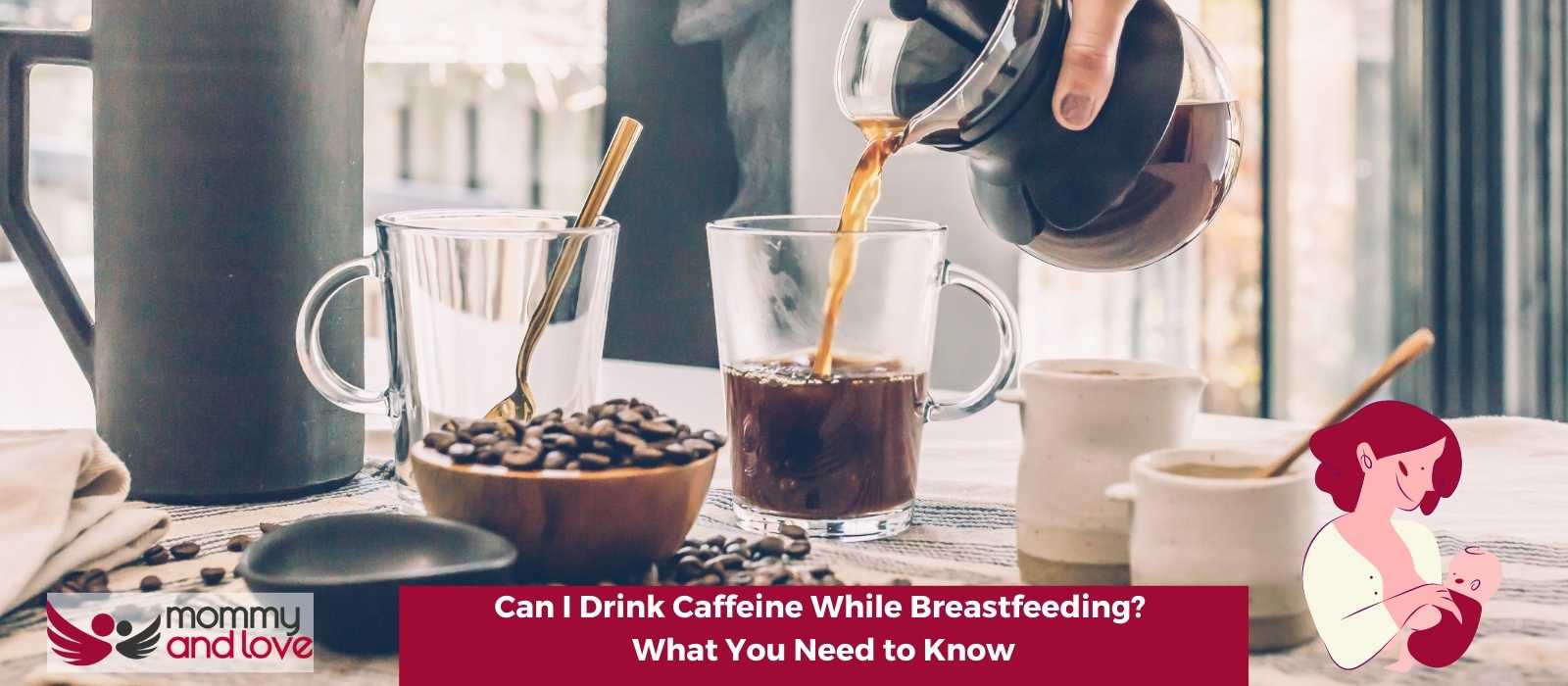If you’re a breastfeeding mom, you may be wondering if it’s safe to drink caffeine aka consume coffee!. This is a valid question, as caffeine does pass into breast milk.
In this guide, we will discuss the effects of caffeine on breastfeeding infants and provide some tips for how to enjoy your favorite caffeinated drink while still providing optimal nutrition for your baby.
What Is Caffeine?

Caffeine is a stimulant found in coffee, herbal teas (black tea and green tea), cola, energy drinks and hot chocolate. You can see the caffeine content of these drinks and foods on their packaging.
It’s also available as an ingredient in some over-the-counter medications for coughs and colds as well as other health conditions.
Most people know that caffeine is a stimulant that can help them stay alert and wide awake but also causes a rapid heartbeat.
How Does Caffeine Work?
Many don’t know exactly how it works. Caffeine blocks the action of a chemical called adenosine. Adenosine makes you feel sleepy, so by blocking it, caffeine keeps you awake.
Caffeine is also a diuretic, which means it makes you urinate more frequently especially if you consume it in moderate amounts.
This is why people often feel the need to use the bathroom after drinking coffee & tea. And this is one of the reasons why it is recommended to limit intake during pregnancy or when you have a breastfed baby.
What Are the Health Concerns About Maternal Caffeine Consumption?
There are some health concerns with regard to caffeine while breastfeeding and during pregnancy. While the exact risks are unknown, you should be careful when consuming caffeine while breastfeeding, particularly when it comes to the amount of caffeine that you consume.
Too much caffeine can lead to adverse side effects on your baby, especially preterm infants.
Caffeine has been shown to be absorbed into breast milk easily, and infants metabolize it more slowly than adults.
This means that it stays in the body longer and can have a greater effect on the infant.
A newborn baby’s liver is not fully developed yet, so they’re less able to break down caffeine than adults. Most babies might be particularly sensitive to the effects of caffeine.
Also, because caffeine is a stimulant, drinking too much could interfere with your baby’s sleep patterns or cause you to produce less breast milk. (It should be noted though that there’s no evidence that any amount of caffeine consumption actually reduces milk supply.)
It’s also important to remember that chocolate contains caffeine as well as coffee or tea drinks even just one cup, so you’ll need to take that into account when calculating the amount of caffeine you’ve consumed for the day.
How Much Caffeine Intake is Considered Safe During Breastfeeding?
The American Academy of Pediatrics has stated that it is safe for nursing mothers to consume small amounts of caffeine and they recommend nursing mothers consume no more than three cups of coffee daily.
However, La Leche League International says it’s okay to drink up to 5 cups of coffee daily while the Centers for Disease Control and Prevention states that 300 mg of caffeine (200mg during pregnancy) is generally safe as a maternal dose. For reference, an 8 oz cup of coffee has 90-170 mg of caffeine.
The occasional morning cup won’t have any effect but moderate consumption does. So if you’re worried, you can always drink decaffeinated coffee if you want to try and eliminate caffeine.
Decaf coffee has low caffeine levels compared to regular coffee. Or you can always talk to a lactation consultant to seek breastfeeding answers.
How Long Does It Take for Caffeine to Affect Breast Milk?

The half-life of caffeine is 5 hours but it can take a couple of hours to peak in the blood. It can stay in the system for up to 12 hours.
For nursing mothers, this means that caffeine will affect their milk for about as long as it’s in their bloodstream. This means that if you have a cup of coffee at breakfast, your baby may still be feeling the effects at bedtime.
How Does Drinking Coffee And Other Caffeinated Drinks Affect Breastmilk?
The answer to this question is a little bit complicated. For most people, caffeine does not seem to have a significant effect on breastmilk supply.
However, for some women, it can reduce milk production. If you are worried that it is affecting your breastmilk supply, it is best to avoid them altogether.
It should be noted that in one of the peer-reviewed studies about caffeine consumption and infant nighttime waking, breastfeeding mothers experienced a slight increase in breastmilk supply.
In any case, you should not drink large amounts of caffeine to increase breast milk supply. There are plenty of safer and healthier alternatives to boost your milk production.
In terms of nutritional quality, recent research suggests that coffee can cause a decrease in the iron content of breastmilk.
How Does Caffeine Affect the Baby Through Breast Milk?
There is still small traces of caffeine in the breast milk even after the mother stops drinking coffee. Caffeine passes through the mother’s bloodstream and into her milk and caffeine levels peak after about two hours.
It takes about two hours for one-half of the caffeine to clear from a mother’s system.
There is no evidence that caffeine causes any harm to breastfeeding a new baby, but it is a good idea to limit caffeine intake while breastfeeding.
Older babies might be fussier or have trouble sleeping if their mothers drink a lot of caffeinated beverages.
Mothers who are very concerned about how much caffeine their baby is getting can try cutting out all caffeine for a few days and see if the baby’s behavior changes.
You can still drink the occasional caffeine beverages, but try and replace some with a caffeine-free beverages. If your babies seem OK with limited caffeine, then the mother can slowly add back in some caffeinated foods and drinks.
Conclusion On Drinking Coffee While Breastfeeding
So, nursing mothers should consume caffeine or drink coffee in small amounts only. How often is up to the mother and what works best for her and her baby?
While there’s no conclusive scientific evidence that proves drinking caffeine can cause direct adverse effects on a baby, just be sure to listen to your body and your baby – if you start feeling jittery or your little one seems fussy, it might be time to lay off the caffeine for some time.
If you’re not sure what is classified caffeine, then check out the packages, generally try and drink less caffeine and reduce the cups sizes to small cups to help you drink less! If you’re wondering if you can drink alcohol (fancy drinking an eggnog whilst nursing), or even soda when nursingcheck out our guides, plus our full guide on foods to avoid when breastfeeding.

This article was written by Sandra Baker – full time writer and the mother of four amazing kids (including twins!)
She’s also a breastfeeding counselor and has spent years helping new parents learn how to care for their children. When she’s not writing or caring for her children, Sandra likes to spend time reading and taking walks with her husband.




